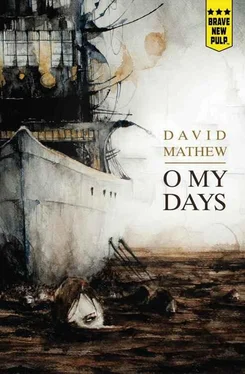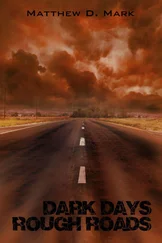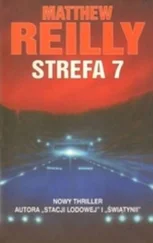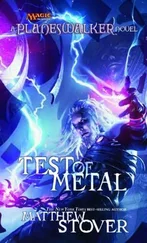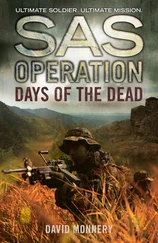Love and God bless you—
Mumsy xxx
Is this the first time my two consciousnesses have fully merged? Is this the first time my two selves have been aware of the other? Have I mingled as surely as hot soup and cream, or am I still closer to the never-the-twain style of oil and water? Oil and water, at any rate, is what I see. It’s what I smell as well as I am lowered, a rope around my waist, by a squad of fellow prisoners, up above me, still serving their time but wishing me well for the future. My sentence has been concluded; in this desert reality I am leaving the ship, my time spent, and in jerky motions I am heading down towards the rowboat. I can’t see myself. There is no third person, omniscient pair of eyes I can use to view how badly or well my body appears. I feel strong. I know that much. As I take my seat in the boat, the muscles I’ve used for years to row a ship that never moves—these muscles sigh and relax. I won’t be needing them in the short term. What I need is a drink of water. I’ll do anything for water, I think as the computer registers the extra weight, my weight, and sets off back in the direction of the shore and the township. My welcoming committee consists of a single person, dressed in black from head to toe, the hood obscuring his face included. When he looks up from his inspection of the oil- smiles on the sand by his feet, I can see his face, weathered and bruised but not old. He looks about thirty. It is Noor. He sports a largely black beard, in which zigzag filaments of the purest white hair. The beard stretches down to his clavicle.
Welcome back, he bids me.
Bids me warmly? Enthusiastically? Not a bit of it, no. Noor is here on duty, nothing but; to add to this air of non-committal there is something ill-at-ease about the man, the hood serving only to support my contention he doesn’t wish to be recognised. What language are we speaking? It has not crossed my mind to question our mutual understanding in this desert landscape—it’s only my memory—yes, memory!—of the screws’ faces in my cell when I’m speaking in tongues that makes me ponder now. In the language we speak I say:
I need to drink water.
Don’t we all? I have money. But you’ll have to buy it yourself and bring it out. There’s not a bar I can enter in Umma where someone won’t see me.
See you? Anyone can see you! You mean recognise you.
Angrily Noor counters with: I know what I mean! To some people I’m invisible. They know I’ve been on the Leper Island. That makes me invisible.
Is that where you went? When you got off the ship.
Noor nods his head; the hood wriggles back on his hairless scalp a few centimetres; Noor wastes no time in rearranging his attire.
Come! he says.
Where are we going? I ask him, the muscles that relaxed now tensing up again. The question hangs in the air as Noor turns and walks away.
To get you a drink, first, he replies over his shoulder.
Then to the desert. Where else would we be going?
With my awareness of all that’s been said inside the walls of Dellacotte YOI, I am able to frame the next thought with succinctness.
Am I dead again?
But call him Dott or call him Noor, the evasiveness is ever present.
Only if you want to be, he says. Come on, walk faster!
We stop at a ramshackle bar. Outside, a rotund European-looking woman is breastfeeding her son. Or a boy at any rate. Reminiscences tell me not to take too much for granted, to take anything at face value.
Noor hands me a warped copper coin, the shape of a fifty pence but lighter in the palm.
Get me one as well, he says. Be quick.
I need something to eat.
I have food.
Where?
With the horses.
Which are where?
In the stable.
Christ, Dott. Which is where? I ask, exasperatedly, pulling on a door that feels like it’s about to fall off its hinges.
Close by. Don’t’ worry: I didn’t steal them.
How do you get them then?
Worked for them. I’ll explain on the way!
This is the extent of my rehabilitation, my integration back into society: a long drink of water in a busy but not packed bar that smells of peanuts, then a walk outside, the shirt I’ve been given glued with perspiration to my spine, and a terse review of my welcome-home repast:
You took your fucking time.
That’s King Billy to you, I want to say. Have I said it somewhere before? I’m not sure. All I know is, there doesn’t seem to be much love lost between Dott/Noor and me at this instant. I tell myself he’s nervous. He has worked as a blacksmith’s apprentice for six months. He has busted toil for no peas, rudeboy. The blacksmith asks if he’s a leper; he tells man no—but he’s been on the island. Why’s he been? Hiding. Wanted. Some blackguards are after his gizzard in a pie. Why, what’s he done? He’s had sex with a woman and left her pregnant. Not the end of the world, the blacksmith opines. The husband doesn’t agree with you, Dott tells him. The horses are on loan—and they’re not the most spritely of creatures. Dott has told the blacksmith, who waves us off (cutely) with a red-hot poker in his mittened hand, standing beside an anvil and sweating cobs. Not far out of earshot I say to Dott:
These horses’ll never make it.
I made it on foot the last time. With a boy to look after.
These horses’ll never make it, I repeat. He won’t see ’em again.
Dott shrugs his shoulders and flips back his hood. Or us, he says, kicking the sides of his steed with sandaled feet.
The horse bolts. Mine follows suit. The difference is, Dott appears to be a competent rider. Me, apart from a bicycle when I’m young and the occasional stolen motorbike I’ve crashed while joyriding, me I’ve never steered anything other than cars I’ve driven without a licence or insurance. Cars are easier than horses (though not as difficult as motorbikes). Takes some breath- catching lurches and near-falls before I learn to ride the animal’s rhythm. Takes skill. The township deliquesces in haze. By looking in glimpses over my shoulder I am able to see it first retreat, then dissolve, then get swallowed up by the yellow and white ground. The patches of sand thicken—stitch together—carpet outwards, the desert proper is what we’re in, and it hasn’t taken long at all. The horses’ hooves pound, their nostrils dilate; the sand is harder to negotiate than the chipped, cracked, lifeless, dry earth. For the riders, too. I for one feel my mount’s heart- meant endeavours and tribulations. I am breathing as hard as the stallion is, I reckon. The sand looks silvery in some directions, from some angles; time is passing, taking its toll on man and beast.
O my days!
The journey takes place in real time, which comes as an unpleasant surprise. What have I been expecting? Spiritual transportation? Well, yeah, I suppose I have. This riding lark’s for the birds, that’s for sure. Heat from the horse’s back is corrosive on my inner thighs, chaffing away at the underhang of my midriff travel bag. My balls are going crazy with jolts of pain.
I need to rest up! I call to Dott.
No time!
What’s the hurry fuck’s sake? Where’s the fire?
Night soon! Dott shouts—he is some ten metres ahead. Rest then!
Soon is no exaggeration—no palliative measure. Desert twilight does not really exist: as with cows sensing rain, the horses’ moods change abruptly as they foresee the end of their working day. At first I regard their slowing down as no more than a sign of fatigue, and fair enough; they’ve charged hard, they’ve earned their oats. But it’s something more instinctive and raw. It’s their body clock—it’s their telepathy with one another that causes them to kill their strides from gallop to canter to trot. They stop. Dott accepts defeat, dismounts and by flipping open his horse’s panniers he wordlessly prepares to camp out for the night. It falls dark and cools down in minutes. Opening my own horse’s panniers—it’s as close to receiving a birthday or Christmas present as I’m likely to experience anytime soon. Dott has been thorough. There is food in brown paper; there are plastic bottles of water. There’s a thick woollen sweater that smells rather too much like its original source for my liking, but which I don gratefully all the same.
Читать дальше
